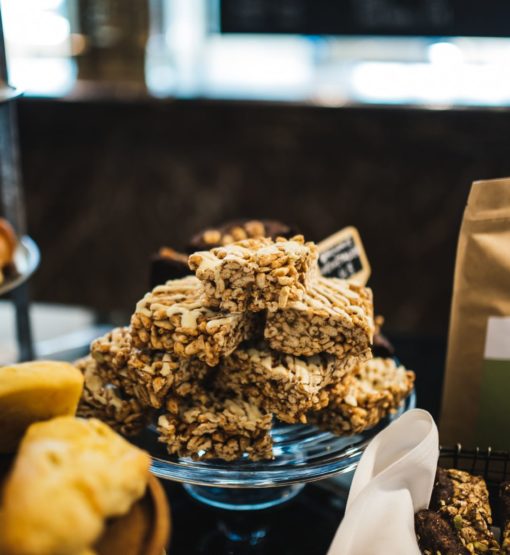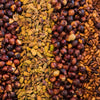The A to Z of Low-Carb Protein Bars

For anyone on a low-carb diet, energy bars are a gift sent from the gods. Traditional candy bars are typically high in sugar and carbohydrates, so low-carb protein bars are the next best thing.
How could you not love something that tastes like candy and packs an impressive amount of protein in such a small package?
Bars aren’t just for gym junkies. Besides being a great way to get your protein in without having to cook, they are:
- Portable
- Shelf-stable
- Convenient
- A low-carb alternative to sweets
In this article, you’ll learn:
What Makes a Great Low-Carb Protein Bar?
Finding the perfect low-carb protein bar is no easy task. The deciding factors in a low-carb protein bar’s rating are:- Taste
- Texture
- Amount of protein
- Net carbohydrates
- Ingredients
Taste and Texture
No matter how great the macros, a protein bar is judged first and foremost on how delicious it is.A great protein bar is usually slightly chewy, but not to the point of feeling like you’re chomping down on a bar of taffy. It should also hold its form without crumbling apart.
This usually comes down to the binding ingredient used. Collagen, MCT oil and fiber syrups provide that perfect chewy texture in many low-carb protein bars.
The type of protein used can also affect this. Whey and collagen will always offer the best texture, while plant-based proteins can create a slightly grainy texture.
And of course, a protein bar has to taste amazing. Flavors can range from chocolate brownie to cookie dough and even birthday cake. Who said you had to give up that junk food experience on a low-carb diet?
Protein
Protein doesn’t just help you to build muscle. It’s also incredibly satiating. If you’re shelling out top dollar for a protein bar, you want it to have a decent serving of protein, right?But here’s the thing: many “protein” bars contain very little actual protein. The protein count can be anywhere from 3g to 30g— that’s a big difference!
Some common protein sources found in protein bars are:
- Collagen
- Egg white
- Whey or whey protein isolate (WPI)
- Casein
- Soy protein
- Pea protein
- Brown rice protein
- Hemp protein
Net Carbohydrates
When factoring the net carb count, remember to subtract the fiber and sugar alcohols from the total carbs.A good low-carb protein bar should have between 1-10g of net carbs, depending on your keto macros. You’ll find most low-carb or “keto” bars have around 3g of net carbs.
Finding a low-carb protein bar requires a little more diligence than looking at the name or carb count on the label. This is because many protein bars that claim to be low-carb aren’t really suitable for low-carb diets at all.
How is this possible? One word: Sweeteners.
Not all sweeteners have the same effect on the body. Despite being sugar replacements, some sweeteners still have a similar insulin response in the body to regular sugar.
These include:
- Maltitol
- Maple syrup
- Agave
- Coconut sugar
- Maltodextrin
You might have heard of natural, keto-friendly sweeteners like stevia, erythritol, monk fruit or xylitol. These all typically have a very low blood sugar response and are natural, calorie-free sweeteners.
They’re the go-to choice for most people on a low-carb diet as they don’t affect the body in the same way that regular sugar would.
Artificial sweeteners like aspartame or acesulfame K don’t impact blood sugar either, but some people like to avoid these due to potential negative impacts on gut health.
It’s also important to be wary of any protein bar labeled “keto” or “low-carb.” These are often just marketing terms that don’t match the carb count on the packaging whatsoever.
Common Low-Carb Energy Bar Ingredients
Not all low-carb protein bars are made equal. There’s so much variation not just in the macronutrient ratio, but the ingredients used.Here are some of the common ingredients found in low-carb protein bars and what they’re used for:
Medium Chain Triglycerides (MCTs)
Derived from coconut, MCTs are a source of fat, provide amazing energy, and are a favorite of anyone following a keto diet!Fiber
Fiber syrups from tapioca, chicory root (inulin) and corn act as a binding agent to give that chewy texture.Lecithin
Lecithin from soy or sunflower helps ingredients to mix and combine before binding together.Nut Butter
Added as a binding agent, a fat and protein source, and for a delicious flavor!Sometimes low-carb protein bars can do more harm than good. Certain ingredients can trigger unwanted reactions and side effects, including bloating, gas and other digestive trouble.
For this reason, some people choose to avoid certain protein bar ingredients even on a low-carb diet. Sometimes the low-carbs just aren’t worth the consequences!
Some potentially troublesome protein bar ingredients include:
- Sucralose
- Allulose
- Xylitol and other sugar alcohols
What About Vegan and Paleo Protein Bars?
Some low-carb protein bars are unsuitable for anyone who doesn’t consume dairy as they usually contain whey protein. Paleo or vegan protein bars instead rely on plant-based protein (such as hemp, rice or pea), collagen, or egg whites.Ironically, many vegan or paleo protein bars contain very little protein and a lot of sugar. These bars tend to be made from dates, which are extremely high in sugar. While they do make for a pleasant, chewy texture, they’re not ideal on a low-carb diet due to the high amount of carbs.
How to Make Your Own Low-Carb Energy Bars
Making your own low-carb protein bars at home is a great way to save money and avoid unwanted ingredients.Here are some great low-carb energy ball recipes that can also be made into a bar:
- Chocolate Coconut Energy Balls
- Nutty Chocolate Energy Balls
- Festive Eggnog Energy Balls
- Mexican Chocolate with Sea Salt Energy Balls
Keto Bar FAQs
Can protein bars help build muscle?
They sure can! Protein is your body’s building blocks and is essential for growing muscle, so protein bars can be a great way to increase your protein.But, you do still need to make sure you’re lifting heavy to encourage your muscles to grow.
Are low-carb protein bars healthy?
That depends on not just the protein bar in question, but your definition of “healthy."Some people choose to avoid foods that are processed, contain sweeteners, and have non-whole sources of protein.
For others, any low-carb protein bar is always a healthier choice than a candy bar because it contains less sugar and has more protein. It’s really up to you.
Are protein bars a healthy low-carb snack?
Protein bars can be the perfect low-carb snack. But sometimes, they’re a bad situation waiting to happen.Protein bars are hyper-palatable, so they’re easy to overconsume. It’s hardly surprising considering they’re essentially an alternative to candy bars.
This is problematic for two reasons. No matter how clean or low-carb the protein bar, overeating them each day can lead to a big increase in carbs. If you follow a keto diet, you could find yourself kicked out of ketosis.
There’s also the issue of calories. Consuming two protein bars a day might be the equivalent of a whole extra meal, depending on the bar.
Do you find yourself overeating protein bars on a low-carb diet? It might be a good idea to temporarily remove them from your diet, especially if you’re new to eating low-carb and are still overcoming your addiction to sweet treats.
Try replacing them with a lower-calorie, unsweetened snack that you know you won’t overeat. See the list at the end of this article for some great protein bar alternatives.
Do I need to eat protein bars on a keto diet?
Despite their perks, protein bars are by no means necessary. But like protein powder, MCT oil, or any other supplement, they can make a great addition to a healthier lifestyle.This is especially true if you work out and struggle to meet your protein intake. Sure, you could boil an egg, cook some chicken breast, or dive into a plate of cured meats. But when you’re short on time or just can’t be bothered, a protein bar is the perfect option.
There’s no reason to eat protein bars if you don’t like them. Maybe you’re not a fan of sweet things, or perhaps you can’t justify the cost.
Luckily, there are plenty of alternatives to protein bars on a low-carb diet. For example:
- Jerky or biltong
- Deli meats (such as salami or prosciutto)
- Boiled eggs
- Keto Cheese Crisps
- Homemade low-carb protein muffins
- Protein shakes
Reference:
NCBI: Non-nutritive sweeteners possess a bacteriostatic effect and alter gut microbiota in mice
-
Posted in
Authority Article, Keto Foods, Low-Carb Diets, Nutrition, Nutrition Article, Product Article




